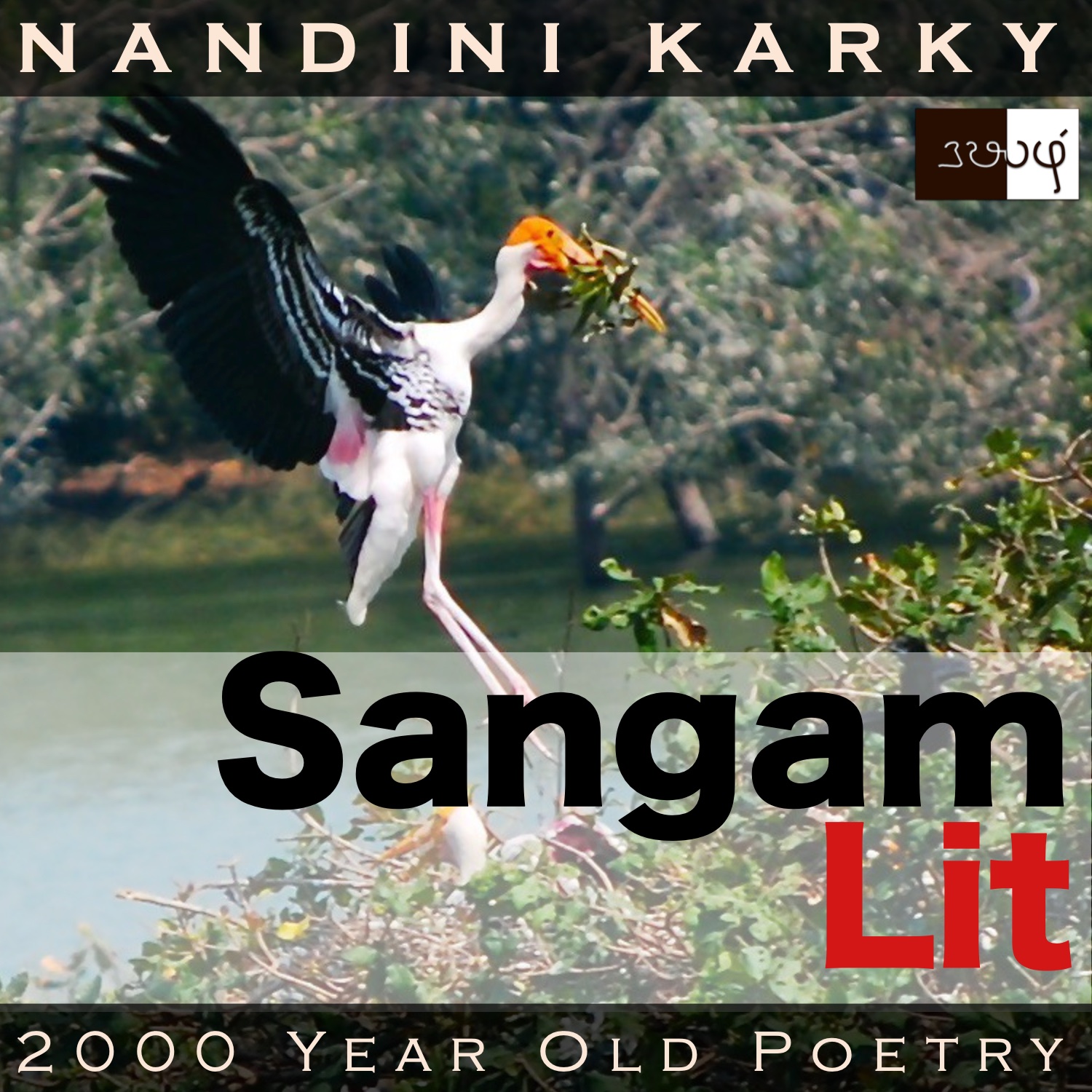Podcast: Play in new window | Download
Subscribe: Apple Podcasts | Spotify | Amazon Music | Android | iHeartRadio | Email | TuneIn | RSS | More

In this episode, we perceive nature and history revealing the inner landscape, as depicted in Sangam literary work, Natrinai 167, penned by an anonymous poet. The verse is set in the coastal regions of ‘Neythal’ and speaks in the voice of the confidante to the singer-messenger, refusing to accept the messenger’s words of appeasement.
கருங்கோட்டுப் புன்னைக் குடக்கு வாங்கு பெருஞ்சினை
விருந்தின் வெண்குருகு ஆர்ப்பின், ஆஅய்
வண் மகிழ் நாளவைப் பரிசில் பெற்ற
பண் அமை நெடுந்தேர்ப் பாணியின் ஒலிக்கும்
தண்ணந்துறைவன் தூதொடும் வந்த
பயன் தெரி பனுவல் பை தீர் பாண!
நின் வாய்ப் பணி மொழி களையா, பல் மாண்
புது வீ ஞாழலொடு புன்னை தாஅம்
மணம் கமழ் கானல், மாண் நலம் இழந்த
இறை ஏர் எல் வளைக் குறுமகள்
பிறை ஏர் திரு நுதல் பாஅய பசப்பே.
‘Welcome to the seaside’ proclaims ‘கருங்கோட்டுப் புன்னை’, those ubiquitous ‘laurel wood trees with black trunks’. Shortly thereafter, there’s the phrase ‘விருந்தின் வெண்குருகு’ meaning ‘visiting white birds’. What’s quaint about this phrase is the word ‘விருந்து’, ‘a feast’, that’s prepared more often for a guest. This word in connection with birds, suggests that these are migratory birds that do not live here and have come to these plentiful shores only to feed. Then, we turn our attention to ‘ஆஅய்’, the name of a generous Sangam king, also called as ‘Aay Aandiran’. ‘நாளவை’ refers to the ‘court’ of kings where poets and craftsmen arrive to display their talent and earn gifts or ‘பரிசில்’. That compact word for a flower, ‘வீ’ makes an appearance in connection with ‘ஞாழலொடு புன்னை’ meaning ‘screw-pine and laurel-wood trees’. The verse finishes by touching upon ‘குறுமகள்’, a ’young girl’ and her ‘திரு நுதல்’, the ‘fine forehead’. Let’s move on from glimpses to the full picture.
The man and lady were leading a happy married life, when the man took to keeping the company of courtesans. The lady is angered by this action of the man and suffers inconsolably. One day, the man wanting to return to his home, sends the singer as his messenger to the lady. The confidante intercepts him and says, “On the dark-trunked ‘punnai’, with long branches curving upwards, the visiting white seabird sings aloud. This birdsong resounds like the bell-adorned, tall chariot that has been given as a token of appreciation for the receiver’s skill, in the court of the generous king Aay. The lord comes from such a shore, filled with coolness! O pitiless bard, you have come here as his messenger. You, who sings in accordance to the benefits to be received. The humble words from your tongue cannot remove the cloud of pining that spreads on the crescent-like forehead of this young maiden with beautiful forearms adorned with bright bangles. This lady has lost her fine beauty on that fragrant shore where the flowers of the ‘punnai’ tree lie scattered about, on the noble flowers of the ‘gnazal’.” With these words, the confidante conveys that the messenger’s words were of no avail and it’s the man who must return and make amends.
Time to unpack hidden metaphors and historical references. As the poem opens, the confidante beckons us to walk to a spot on the shore, where a dark-trunked ‘punnai’ tree stands, and she points to the curved branches of that tree. Peering, we find there’s a white bird sitting there. Seems like a stranger, a guest who has come from a far-away land. Then, we hear the bird making a loud call. The confidante turns to us and with her words, transports us to another scene just then. It’s the court of the Sangam king, Aay Aandiran, one who has been described as the delight of every poet and artist in the kingdom. This king doesn’t just shell out a small sacks of gold when he’s happy with some artisan. He gives them tall chariots adorned with bells. Researching, I learnt that tall chariots were not the only item on his menu of disbursal. Seems the king was known to give away elephants as gifts to bards and musicians. Hefty compensation, indeed! The confidante says the sound of those birds by the beach is akin to the sound of those gifted chariots adorned with bells. As always, she finishes by saying such is the land of the lord but we know better. The reference to birds that sound like chariots on the roll, is a metaphor to say that the bard’s words screeches on their ears, reminding them that he says these words for the gifts he will receive from the man and therefore, they are without truth and feeling.
The confidante then says that the man had sent the singer and no matter, how sweet and pleasing the words he sheds may be, they cannot alleviate the lady’s suffering. The disease of pining has attacked the lady’s forehead and her bright bangles are slipping away from her forearms. She adds that the lady has lost her health and beauty in that seaside grove, where fallen flowers of the noble ‘gnazhal’ tree lies together with the ‘punnai’ flowers. The stress on the adjective ‘noble’ hints to us that this is a metaphorical reference to say the man has given the attention to be accorded to the lady to the courtesan, considering them one and the same. Thus, the lady is filled with ire at this treatment meted out by the man and the messenger’s words will bear no fruit in reconciling her. Seeing beyond those poignant scenes in nature and portraits of kings, we understand that the confidante is conveying to the man, ‘The right way to say something to someone is to say it yourself.’




Share your thoughts...